On May 10, the "2022 China-Europe Seminar on Human Rights ", hosted by the China Society for Human Rights Studies and the Austria-China Friendship Association, organized by the National Human Rights Education and Training Base, Institute for Human Rights Law of Huazhong University of Science and Technology, and the Austria-China Law Association, was successfully held. This seminar has two main venues in China and in Austria, and the main venue in China is located in theWutongyu Academic Exchange Centreof Huazhong University of Science and Technology. Representatives from thethe UN’sOfficeof the High Commissioner for Human Rights and more than 100 human rights experts and scholars from the political, academic, legal, scientific and technological fields of China, Austria, France, the United Kingdom, Germany, Hungary, Italy, Greece, Spain, etc.discussedtechnology and human rightsin an"online + offline"way.
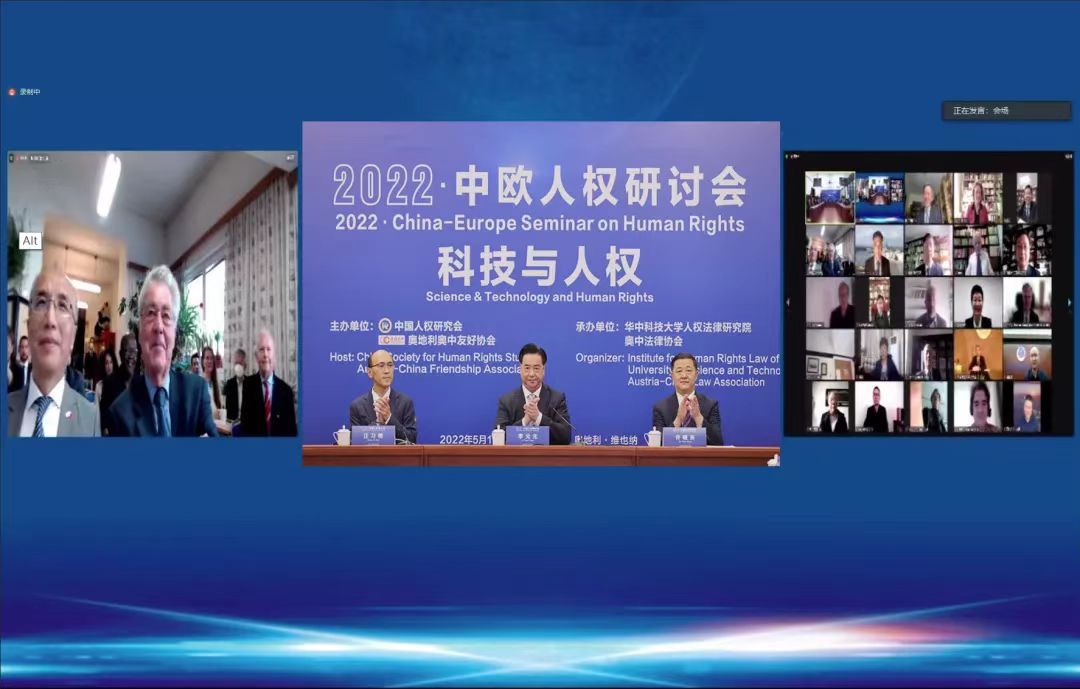
The seminar set up a keynote speech session and three parallel sessions. The keynote speech session was presided over by Wang Xigen, Dean of the Law School of Huazhong University of Science and Technology, Dean of the National Human Rights Law and Training Base andthe Institute for Human Rights Lawof Huazhong University of Science and Technology. Fifteen well-known experts and scholars made wonderful speeches on the theme of technology and human rights from different perspectives.
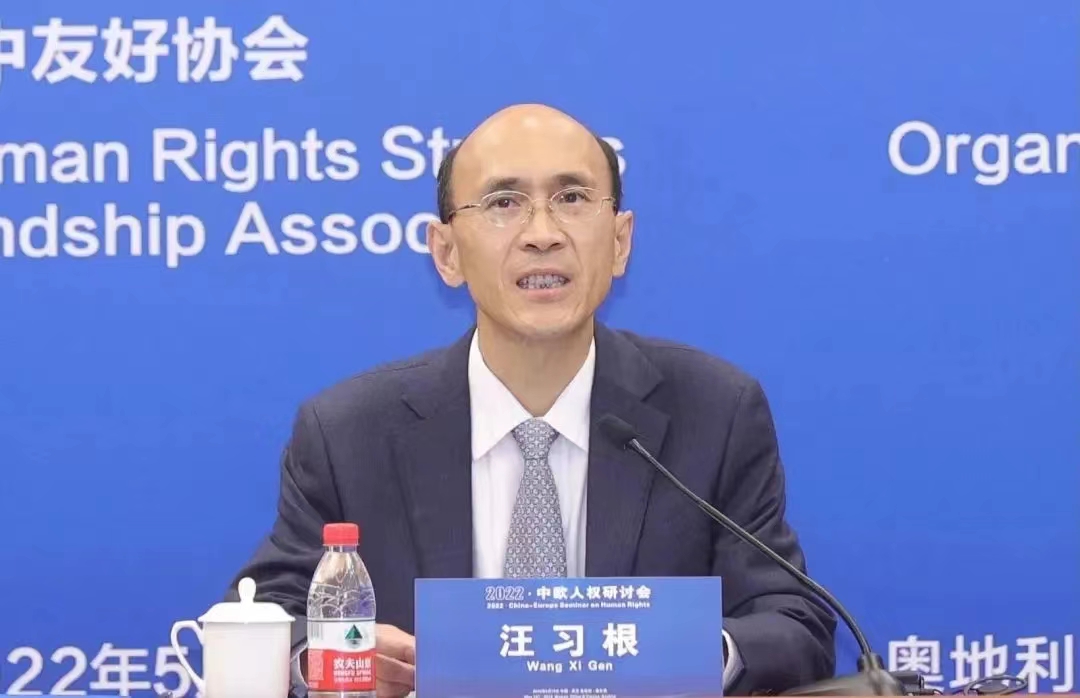
Opportunities, Challenges and Responses to Human Rights Protection in the Digital Age
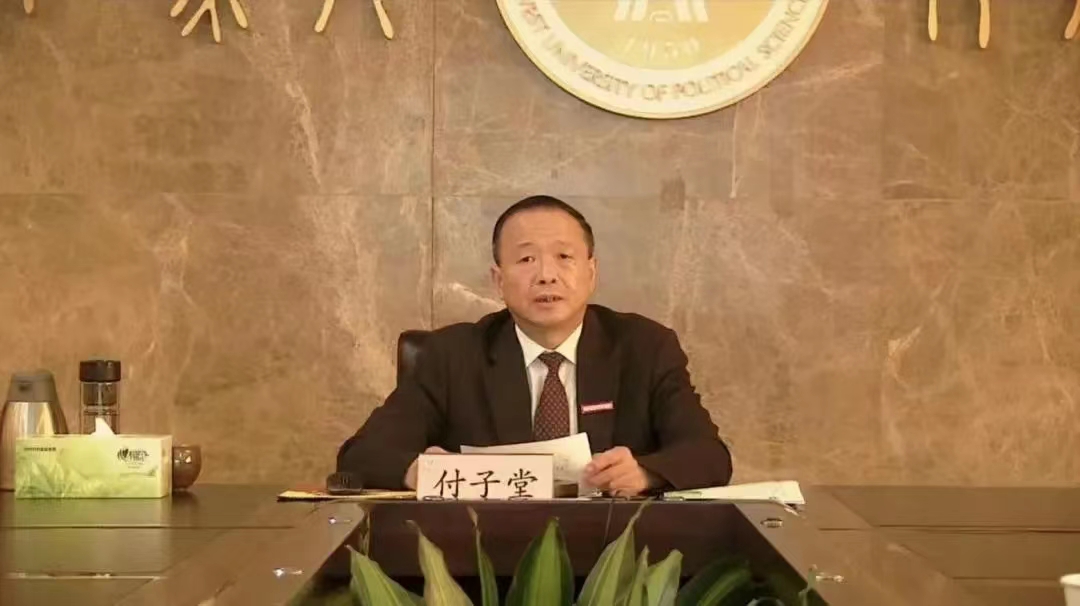
FU Zitang, Vice President of China Society for Human Rights Studies, President of Southwest University of Politics Science and Law, delivered a speech on the theme ofOpportunities, Challenges and Responses to Human Rights Protection in the Digital Age. He elaborated on three points: First, technology is the primary productive force, and human rights are the primary guiding force. Digital technology is profoundly changing and even reshaping human life styles, behavior patterns, values, social relationships and social structures. At the same time, it also profoundly affects the breadth, depth and height of human rights. Second, the development of science and technology and the protection of human rights must alsoachieve a positive interaction. Specifically, it can be summarized into four aspects: using modern technology to betterhelphuman rights protection, using good laws and good governance to ensure the steady and long-term development of human rights, using academic research to promote the integrated development of technology and human rights, and using scientific planning to support a higher level of human rights protection in the future. Third, technological development and human rights protection could and must work together on the right track. He believes thatweshould work together from the following three aspectsin the future: First, in the value orientation of scientific and technological development, we must always focus on the great goal of respecting and protecting human rights. Secondly, in the way of human rights protection, we must pay attention to the new achievement of applying intelligent technology. Thirdly, on the specific path for the coordinated development of science and technology and human rights, the two must go hand in hand.
Challenges and Opportunities for International Human Rights Law from New Information Technologies

Christine Binder, Professor of European, International and Comparative Law, University of Vienna and Bundeswehr University Munich, delivered a speech on the theme ofChallenges and Opportunities for International Human Rights Law from New Information Technologies. She pointed out that the COVID-19 is both an opportunity and a challenge for the development of human rights. In terms of opportunities, information technology can help safeguard the right to life and health, and help to trace infected people and their contacts, thereby making treatment faster and more efficient; information technology enables more reliable and rapid access to epidemic-related information; information technology assistingdistance learning protects the right to education; information technology protects religious freedom and the right to vote. In terms of challenges, emerging information technologies to locate and monitor people in quarantine posesthe risk of disrupting their privacy. Therefore, the utilization and storage of personal health information must comply with strict conditions and establish safeguards, and the storage system should comply with the international data protection principles. The exploitation of new technologies can only achieve their full potential and serve the protection of human rights if they comply with the conditions stipulated by human rights law.
Social Credit and Human Rights
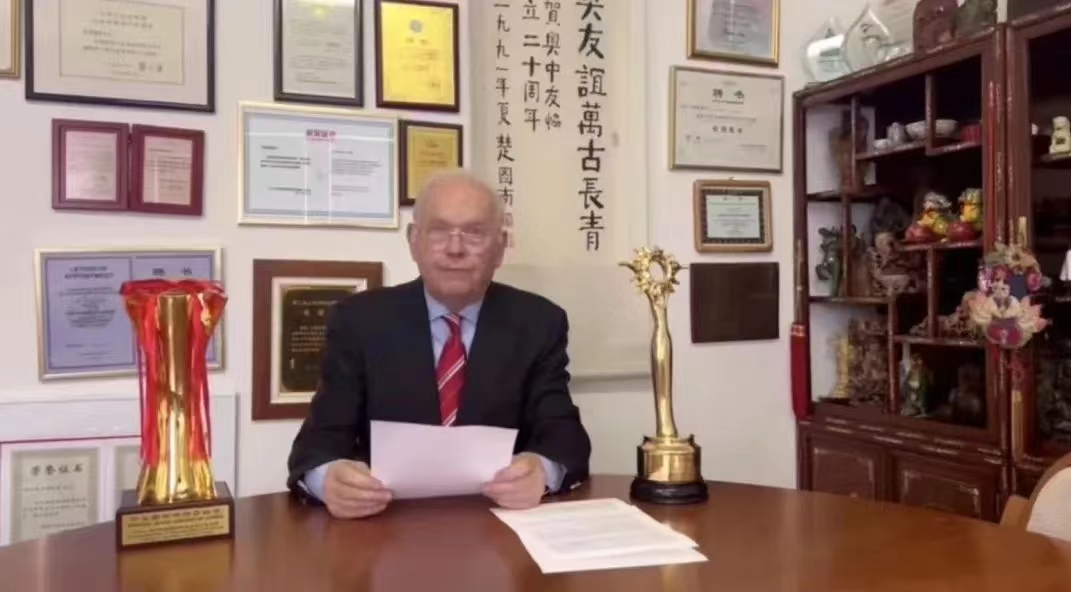
Gerd Kaminsky, Executive President of the Austria-Chinese Friendship Association,Director of Austrian Institute of China and Southeastern Asian Studies ,Director of European Research Center,Institute for Human Rights Law, Huazhong University of Science and Technology, delivered a speech on the theme ofSocial Credit and Human Rights. He pointed out that the social credit system has a long history in China, and the concept of this concept is adapted to China's market economy and consumer society. At present, the establishment of China's social credit system mostly draws on foreign systems, and the advantages and disadvantages coexist, posing new challenges to the rule of law and human rights protection. But he was pleasantly surprised that the public's response to the Social Credit System was positive and more pronounced among wealthier and more educated groups of urban citizens. At the same time, it is also suitable as a tool to strengthen the government's economic governance capacity, promotingfair competition in the domestic market, and market regulation and corporate compliance. It is not yet clear how to comprehensively, profoundly and effectively advance the implementation of this system, nor when exactly this ambitious social credit policy goal will become a reality.
Technology Development and Human Rights Protection
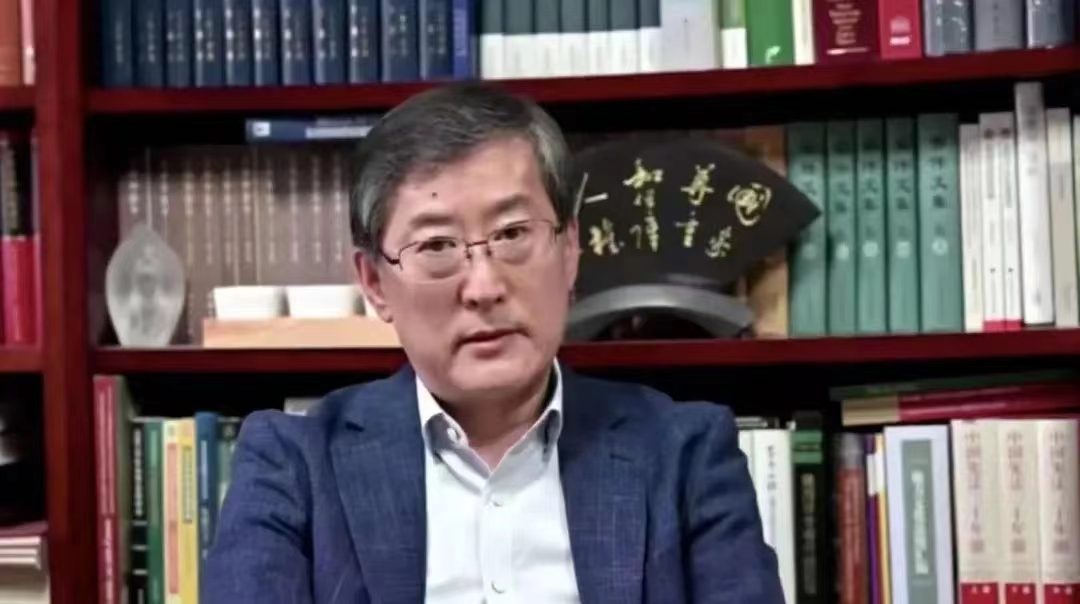
Han Dayuan, Director of Institute for Legal Studies in One Country Two Systems, Renmin University of China,Professor of Law School, Renmin University of China, delivered a speech on the theme ofTechnology Development and Human Rights Protection. He mentioned that how to deal with the relationship between technological development and human rights protection is one of the biggest challengesfaced bycontemporary countries, and human rights protection should have a global common value. There is a certain correspondence between the development history of science and technology and the development history of human rights. He discussed from three aspects: From the perspective of value, maintaining human dignity is the basic value pursuit of scientific and technological development, and it is also the basic mission of scientific and technological development. From the perspective of constitutional norms, there should be reasonable restrictions on the freedom of scientific research protected by the constitution, and policies for scientific and technological development should be regulated in the spirit of the constitution to ensure that science and technology can better play its role in maintaining human dignity. From the perspective of science and technology ethics, a balance can be sought between the development of science and technology and the protection of human rights. The ethics of science and technology is an important moral basis for solving the contradiction between the development of science and technology and human rights today. He also mentioned that the development of science and technology and the protection of human rights affect and promote each other, but at the same time, the development of science and technology also threatens the consensus on human rights.It is necessary to develop human rights consensus on the basis of scientific consensus and promote scientific and technological development under the consensus of human rights.
Reflections on Technology and Human Rights
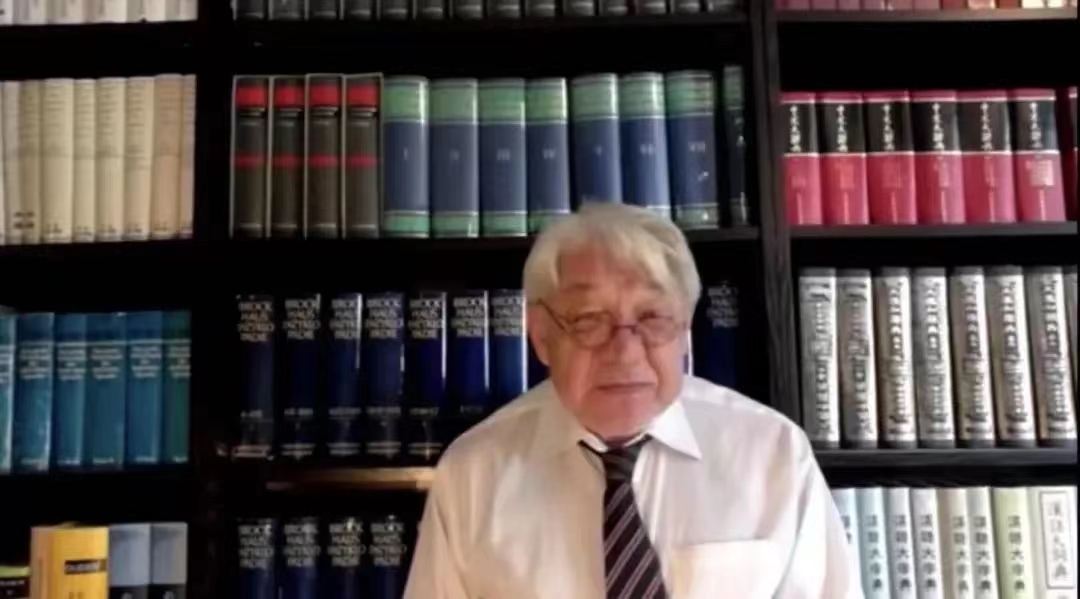
Wolfgang Kubin, Professor of University of Bonn in Germany, delivered a keynote speech onReflections on Technology and Human Rights. First of all, he explained the development process of the concept of Technology, which gradually turned from Aesthetics when it was put forward to Means, which became a professional term of Karl Marx after Hegel - the way to improve the destiny of mankind. He mentioned that many ancient scholars believe that people are in a predicament, they cannot rely on instinct like animals and need to use technology to overcome shortcomings and save themselves. He pointed out that in the age of technology, people are under surveillance all the time, and the concept of human rights has not really improved this phenomenon. With regard to human rights, he said that the Man in the Declaration of Human Rights in Paris, France, is narrow-minded, including neither women nor slaves. In addition, Karl Marx believes that humanism is the elimination of alienation, and he expects China to make it a reality. In the West, human rights are no longer a legal issue. They are firmly in the hands of the media, and the media use technology all over the world to tell this lie in the guise of truth, threatening everyone it wants to destroy.
Human's Digital Survival and Human Rights Protection
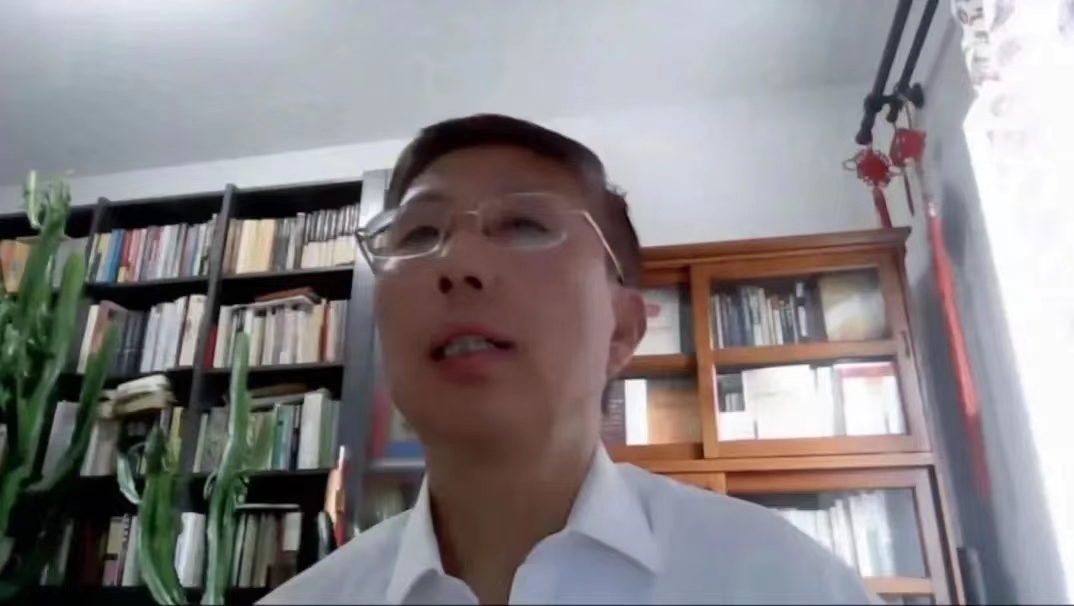
ChangJian, Director of the Human Rights Research Center of Nankai University, gave a speech on the topic ofHuman's Digital Survival and Human Rights Protection. He pointed out that in the digital age, digital survival has become an important part of people's basic way of life, and a series of human rights protection requirements related to digital situations have arisen, including equal use of digital technology without discrimination, free fromthe exploitation of digital technology, free from the manipulation of people by digital technology, as well as the autonomous control of personal digital information and property. He said that in the face of increasingly specialized and powerful digital technologies, the protection of human rights in the digital age not only requires the government to establish laws and regulations to regulate the development and application of digital technologies,andto establish specialized relief agencies and relief methods to supervise data companies and online social platforms,but also requiresenterprises and online social platforms to develop and use digital technologiestostrengthen self-discipline and establish digital technology application ethics that everyone must abide by.
The Contribution of Science and Technology Development to Human Rights
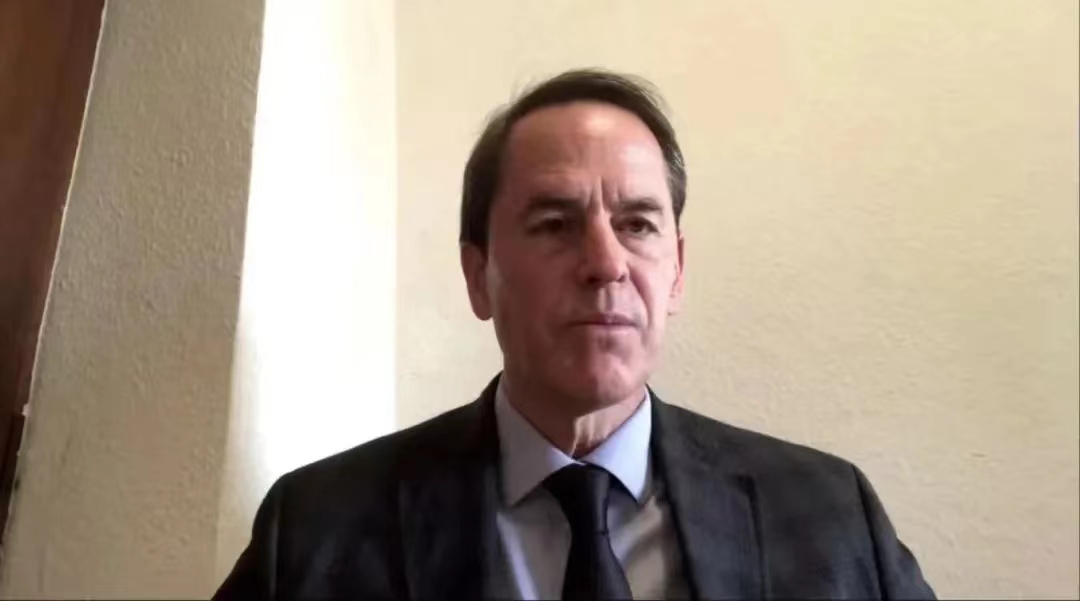
Todd Holland, Director, Development and Economic and Social Affairs Bureau, UN Human Rights Office, delivered a speech on the topic ofThe Contribution of Science and Technology Development to Human Rights. He sees human rights as an effective way to ensure that technology serves all humanity. As a double-edged sword, technology can not only actively protect human rights, but also bring certain challenges. Therefore, technology itself does not have a positive or negative impact on human rights. The focus is on how to link technology and human rights to ensure that technology promotes the development of human rights to the greatest extent. Based on this, he proposed three aspects related to human rights and technology. First, the right to science and technology. The state should promote the development of science and technology in the direction of ensuring human happiness, and then use science and technology to promote the solution of social problems. Second, human rights and business.Enterprises should beaware of their human rights responsibilities while innovating and using technology. Third, the right to development. People should enjoy the fruits of scientific and technological development on an equal footing, and we should leverage the importance of science and technologyto the right to development in the context of the COVID-19 pandemic. Finally, he called on all countries in the world to work together to establish an equal economic relationship and technology sharing system, and respect common but differentiated responsibilities.
Digital Technology Development and Protection of Data Privacy
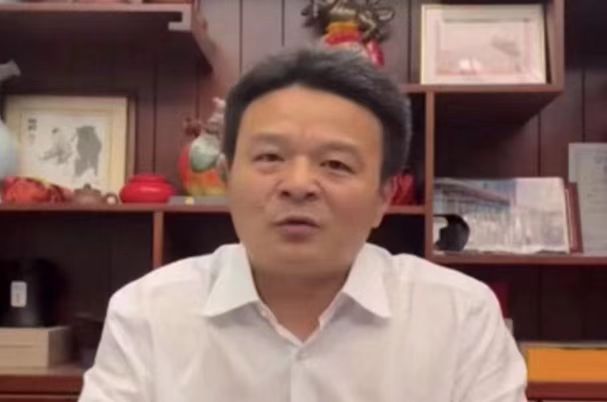
Mr. SunJin, Director of CompetitionLaw and Policy Research CenterandExecutive Director of Network Governance Research InstituteofWuhan University, gave a speech on the topic ofDigital Technology Development and Protection of Data Privacy. He pointed out that the Antitrust Lawincreasingly concerned about the personal information protection issue in the context of big data. Anti-Monopoly Law Enforcement Agencies have given negative evaluations and strengthened supervision of the behaviors of compulsively collecting unnecessary user information and infringing user privacyfrom operators with market dominance. And he proposed that there are three aspects of privacy in the Competition Law: first of all, it is the privacy of consumer benefits; secondly, it is the privacy protection as competitive factors; finally, it is to enhance the market powers of the platform by infringing privacy. The directly regulation of Antitrust Law to the violation of privacy hasfacedproblems such as lack of legislative purposes, limited law enforcement resources, and weak cooperation of different law articles. Therefore, it is feasible to seek indirect regulation approaches. There are two dimensions of the criteria for the indirect regulation approaches of Anti-trust Law. One is that the invasion of privacy can effectively benefit the company toobtain or maintain its monopoly capability; the other is that the infringement of privacy constitutes an exclusive abuse and damages the normal market competitive order. Personal privacy protection is one of the core contents of human rights protection. Inthe context of the development of digital economy, rationalizing the privacy protection of personal data is a positive response to human rights protection.
AHumanRights-based Approach on Science and Technologyfrom a European Perspective
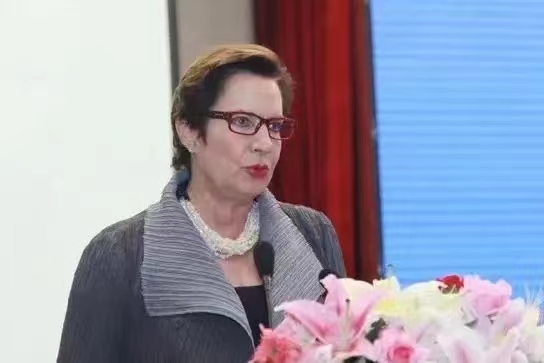
Ms.Elisabeth Steiner, ProfessorofFH Campus Wien, Austriaandformer judge of the European Court of Human Rightsaddressed on the topic ofA Human Rights-based Approach on Science and Technology from a European Perspective. She proposedthat artificial intelligence and digital algorithms have become an indispensable part of human life. In order to prevent the invasion of basic rights and freedom of citizens, from the European perspective, the design of Artificial Intelligence and Digital Algorithms must be inline with the strict standards of security and basic rights protection for traditional technologies in European laws. However, in terms of existing laws, theGeneral Data Protection Regulation(GDPR) still has deficiencies in regulating algorithms of countries and private enterprises. To this end, the European Commission proposed a reform in 2020 to formulate theDigital Service Lawand theDigital Market Lawfor digital services. In addition, the European Commission has adopted the strategies of formulating European Artificial Intelligence, establishing human rights digital protection guidelines, and issuing relevant measures such as digital human rights infringement reports. In short, in the future, human beings still need to continue to establish and maintain the check-and -balance mechanism to minimize the negative impact of new technologies, to prohibit and sanction invasive behaviors to human rights, and to ensure equal and non-discriminatory use of technologies in order to enable everyone to enjoy theopportunity and convenience brought by new technologies.
Legal Protection of the Rights of Digital Citizens
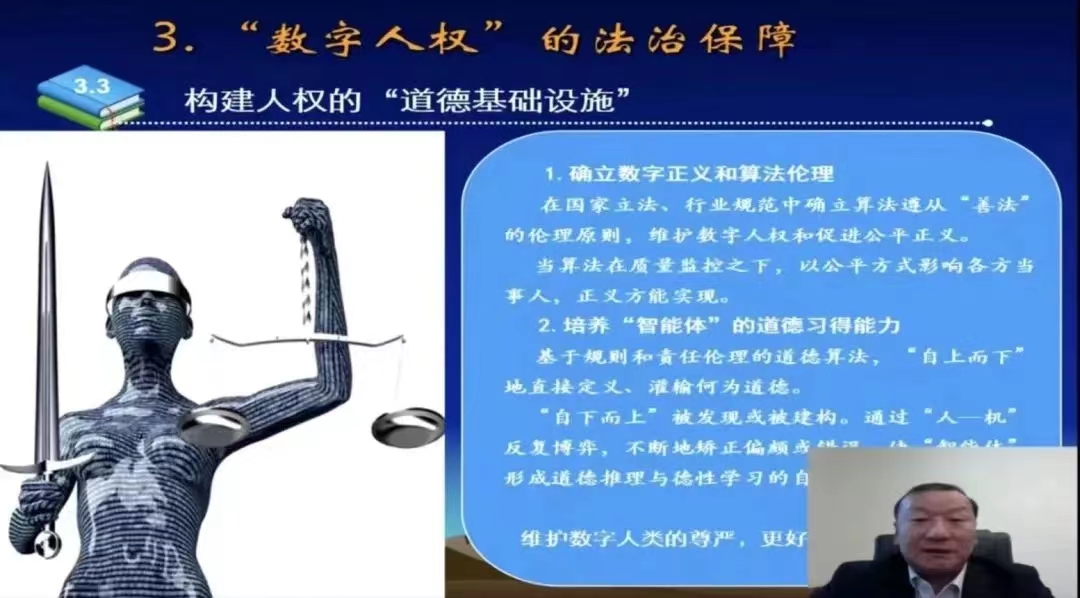
Mr. Ma Changshan, Professor of School of Law, East China University of Political Science and Law, gave a speech on the topic ofLegal Protection of the Rights of Digital Citizens. He said that the accelerated integration and development of network technology, information technology and Artificial Intelligence technology brought huge human right revolutions. These changes are mainly manifested asthe ways of people’s information existence, and give human rights digital attributes. The data information ecology of right development has promoted the digital evolution of human rights. The distribution and sharing forces of information are deconstructedand reshaped. It can be seen that today's information revolution is not the simple expansion and extension of existing production methods and life-styles, but the overall replacement of digital society on traditional industrial and commercial society, which has created the Fourth Generation of human rights:Digital Human Rights. There are four main characteristics. Firstly, in terms of development motion, it is derived from the information revolution. Secondly, the fundamental steering occurred inconnotation logic. Thirdly, quality upgrades have been achieved in the core of value. Fourthly, in terms of relation construction, social extension of associated obligations is present. In short, the emerging digital human rights break through the theoretical framework and protection mechanism of the existing three generations of human rights, and moved to the fourth generation human rights from general. Therefore, how to protect digital human rights will become a major historical mission in the digital age.
Technology and Human Rights

Mr. Graham Perry, British Human Rights Lawyer and Expert in Arbitration, gave a speech on the topic ofTechnology and Human Rights. When it comes to history and democracy, hebelievedthat every country has its own democratic characteristics and reflects its historical process. China andBritainhave different human rights development paths. The current situation of Britain reflects the political journeyfrom autocracy to democracy: from the government of omnipotent autocratic king to the government of political party selected on the basis of "one person, one vote" and five-year national elections. China is constantly moving forward on the road of success and failure, and adopts a democratic centralized system to reflect thepolicies of the people's needs and wishes. In China, people are looking for truth from facts; in the UK, people evaluate policies based on whether it is valid. When it comes to democratic centralized systems, he believed that seeking truth from facts is the basis of scientific researches of all policies. This is a process that requires debates in order to formulate policies that meet the people's expectations. However, outlaws also use technology and freedom of speech to create confusions. He believed thatthere is no absolute freedom, and freedom is limited. He mentioned that technology is great, and it can be used to promote progress and improve the well-beings of people from all countries. However, technology is also a political issue, and the governmentneeds to be alert totheusingfrom outlaws.
On the Significance of Infrared Thermal Imaging Technology to the Protection of Human Rights
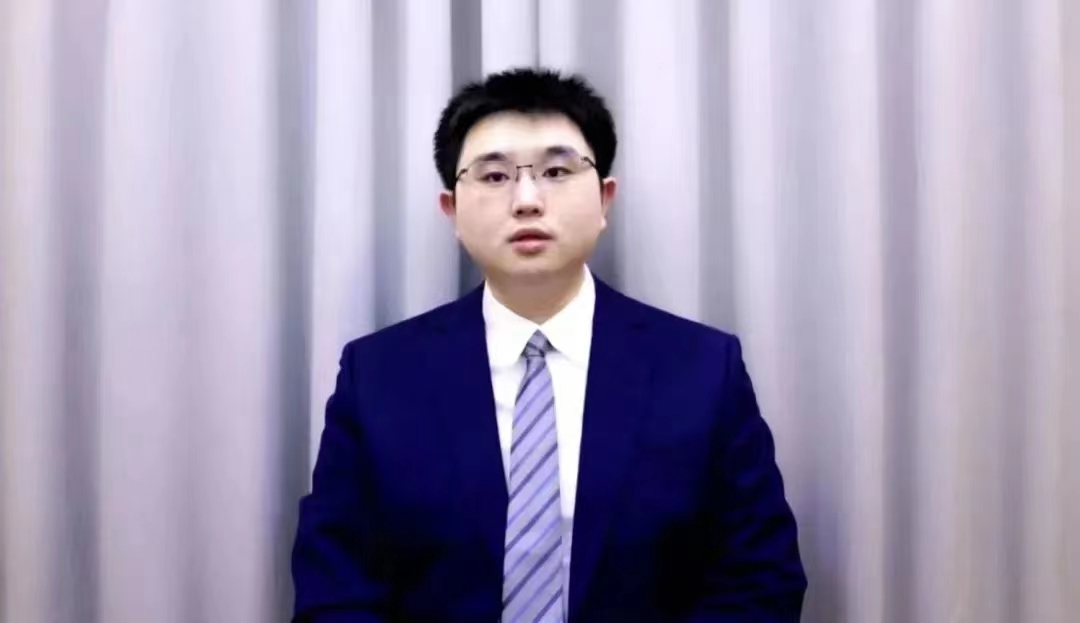
Mr. Huang Sheng, Chairman of WuhanAutoNavi Tech Co., Ltdaddressed on the topic ofOn the Significance of InfraredThermal Imaging Technology to the Protection of Human Rights.He said that technology is inclusive, and the original intention of scientific and technological innovation is to serve human development and progress, which also coincides withthecorporate mission "to benefit the public with Infrared Thermal Imaging Technology". The happy life of people is themost importanthuman rights. As a technology company,Wuhan AutoNavi Tech Co., LtdusesInfrared Thermal Imaging Technologyto improve people's work efficiency and quality of life, and contributes to human rights to fully guarantee human rights. InfraredThermalImagingTechnology has long been widely used in various industries such as medical industry, smart driving and smart home, and silently participatesin the protection of people's living and development rights. For example, during theCovid-19prevention and treatment process,InfraredTemperatureScreening productsformAutoNavi Tech Co., Ltdbuilt the first safety defense for airports, railway stations, hospitals, schools and otherdensely populatedpublic places to ensure people's right to life and health,and thus was affirmed and praised by the State Council.
The Impact of New Technologiesin Emerging Challenges

Mr. Matteo Bressan, Special Researcher of NATO Defense CollegeFoundation and Professor from SIOI,Italy, addressedThe Impact of New Technologies in Emerging Challenges.He mentioned that theCovid-19is the latest major epidemic. Looking back over the situation,how people benefited from technology at the timehas great guiding significance for the current situation. He mentioned that some solutions studiedin the past are essential to identify diseases andtorestrict the spreadof diseases. He mainly talked about the Internet of Things (IoT), Medical IoT (IoMT) and other emerging intelligent technologies, such asunmannedaerialvehicle, robots,automatic vehicles(AVs), Bluetooth and Global Positioning Systems (GPS). These modern technologies show huge effectiveness and prospects,includingtheirimpactson human rights. The development of the Internethasbroadened the channels for acquiring knowledge. Emerging technologies such asArtificialIntelligence may significantly improve the availability of data, thereby providing important reference information for social policies and medical care decisions. These technologies will create new opportunities, improve efficiency, and maximize human potentials. For example,ArtificialIntelligence, automation, and zero-worker economy can liberate people from heavy work, enrich people's life, and build a common prosperity society.
Democracy in the 21st Century: China&EU
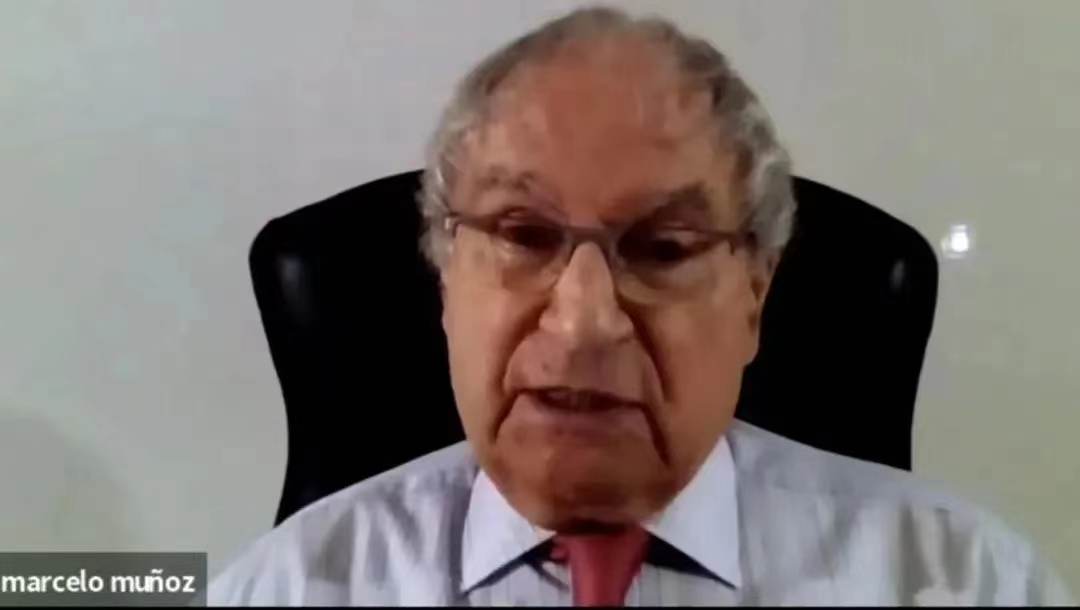
Mr. Marcelo Munoz, Honorary Chairman of the Spanish “Zhihua Lecture Hall”, addressedDemocracy in the 21st Century: China&EU.He proposed that many countries are considering their ownasdemocratic countries at present, but there is a huge difference in the type and degree of democracy. In the 21st century,western society still declare that itis a model of democracy and accuseChina of lack of democracy. But in fact, the EuropeanUnion'sliberal democracy is dominated by personal freedom andrule of law, and China's "democracy with Chinese characteristics" is dominated by collective interests and respect for theauthorities.They both are themost suitablesystemsfor peopleintheir country.There is no claim in China to impose one systemonanotherone. He mentioned that the world needs and requirescontinuous and serious dialoguesbetween the EU and China, and requires a deeper understanding between different systems. This understanding is likely to be realized through the dialoguesbetween the philosophy of Enlightenment and the Confucian philosophy, because there are many similarities betweenthem. This dialogue will definitely help us improve the participation of citizens in democracy with Chinese characteristics and western liberal democracy.
Development of Science and Technology Promotes Judicial Protection of Human Rights
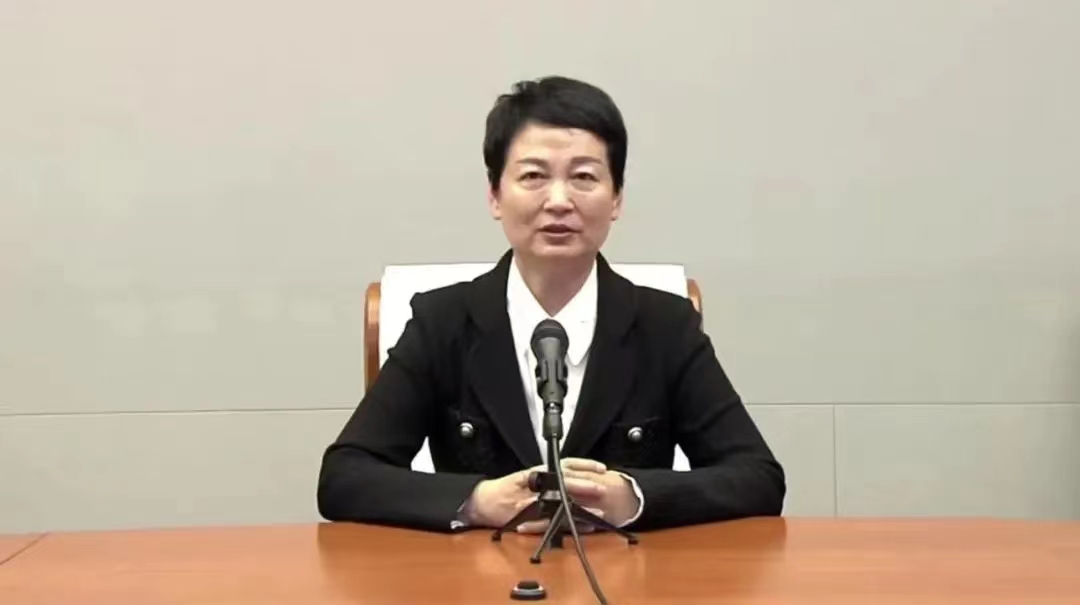
Ms. LiXiao, FirstClassInspector and Senior Judge of the Research Office of People’s Supreme CourtaddressedDevelopment of Science and Technology Promotes Judicial Protection of Human Rights.She pointed out that in recent years, the Chinese courts have closely followed thepulse of the Internet era, adhered to the concept of rule of lawon the basis of"people-centered" human rights, continuously deepened the construction of InternetJusticeandSmartCourts, vigorously promoted the in-depth integration of emerging technologies and judicial work, and established new Internet judicial work. Since the outbreak of theCovid-19, the Chinese court has vigorously promoted online proceedings to achieve "constant trial implementations to achieve constant fairness and justice" duringthe epidemic, ensuring that the parties' right can be effectively realized. From the following five aspects, shesharedthe new progress of the Chinese courts in the Internet era with the help of scientific and technological development: to strengthenthe construction of smart courts to provide strong scientific and technological support for justice; to fully guarantee people's litigious rights in all aspects via the construction of one-stop multiple solutions and litigation service system; to strengthen the disclosure of justice to ensure people’s rights to be informed, to participate, to be heard, and to oversee; to ensure the improvement of online mediation in order to resolve disputes in time and to meet the judicial needs of people; to improve thequality and efficiency of the trial and to ensure the property rights of the prevailing parties.
Mr. Wang Xigen briefly summarized the Session. He said that the fifteen Keynote Speakersare all influential experts in their fields.Some concentratedon the impact of information technology on human rights from the perspective of International Human Rights Law and European Human Rights Convention.Some focusedon how new technologies improve the well-beings of all human beings. Some scholars explained the functions of human rights in Europe and China in the perspective ofdemocracy. He pointed out that the speeches are very ideological and forward-looking to respond to some issues of science and technology and human rights at the current stageof development, reflecting the common responsibility of China and Europe to respect and guarantee human rights, and marked an importantstep forward in the in-depthexchanges and cooperation. Finally, on behalf of the conference organizers, he expressed his sincere gratitude to all the experts andparticipants.